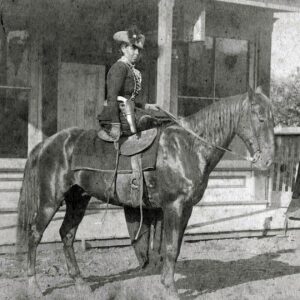From authors to outlaws, female pioneers helped to shape frontier society.
September 9, 2020
On Sept. 14, 1920, Connecticut became the 37th state to ratify the 19th Amendment, which guaranteed women the right to vote. The exercise was largely symbolic, since ratification had already been achieved thanks to Tennessee on August 18. Still, the fact that Connecticut and the rest of the laggard states were located in the eastern part of the U.S. wasn’t a coincidence. Though women are often portrayed in Westerns as either vixens or victims, they played a vital role in the life of the American frontier.

The outlaw Belle Starr, born Myra Belle Shirley, in 1886.
PHOTO: ROEDER BROTHERS/BUYENLARGE/GETTY IMAGES
Louisa Ann Swain of Laramie, Wyo., was the first woman in the U.S. to vote legally in a general election, in September 1870. The state was also ahead of the pack in granting women the right to sit on a jury, act as a justice of the peace and serve as a bailiff. Admittedly, it wasn’t so much enlightened thinking that opened up these traditionally male roles as it was the desperate shortage of women. No white woman crossed the continent until 17-year-old Nancy Kelsey traveled with her husband from Missouri to California in 1841. Once there, as countless pioneer women subsequently discovered, the family’s survival depended on her ability to manage without his help.
Women can and must fend for themselves was the essential message in the ‘”Little House on the Prairie” series of books by Laura Ingalls Wilder, who was brought up on a series of homesteads in Wisconsin and Minnesota in the 1870s. Independence was so natural to her that she refused to say “I obey” in her marriage vows, explaining, “even if I tried, I do not think I could obey anybody against my better judgment.”
Although the American frontier represented incredible hardship and danger, for many women it also offered a unique kind of freedom. They could forge themselves anew, seizing opportunities that would have been impossible for women in the more settled and urbanized parts of the country.
This was especially true for women of color. Colorado’s first Black settler was a former slave named Clara Brown, who won her freedom in 1856 and subsequently worked her way west to the gold-mining town of Central City. Recognizing a need in the market, she founded a successful laundry business catering to miners and their families. Some of her profits went to buy land and shares in mines; the rest she spent on philanthropy, earning her the nickname “Angel of the Rockies.” After the Civil War, Brown made it her mission to locate her lost family, ultimately finding a grown-up daughter, Eliza.
However, the flip of side of being able to “act like men” was that women had to be prepared to die like men, too. Myra Belle Shirley, aka Belle Starr, was a prolific Texas outlaw whose known associates included the notorious James brothers. Despite a long criminal career that mainly involved bootlegging and fencing stolen horses, Starr was convicted only once, resulting in a nine-month prison sentence in the Detroit House of Correction. Her luck finally ran out in 1889, two days before her 41st birthday. By now a widow for the third time, Belle was riding alone in Oklahoma when she was shot and killed in an ambush. The list of suspects included her own children, although the murder was never solved.





